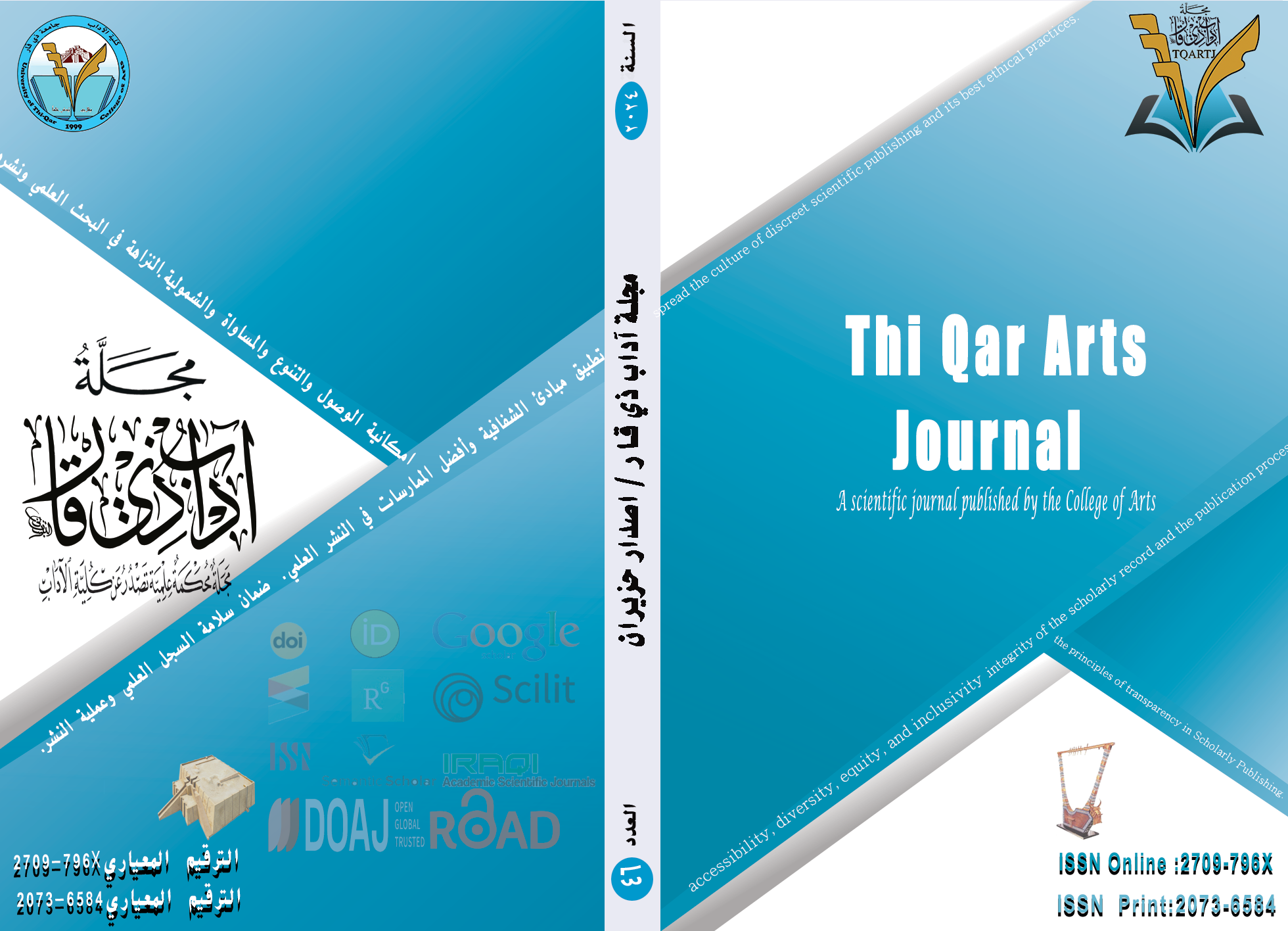Exploring Evaluation Language in the Conclusion chapter of MA Dissertations: Analyzing of Iraqi EFL Learners' Writings
DOI:
https://doi.org/10.32792/tqartj.v5i46.599Keywords:
Evaluative Language, Attitude, Affect, Judgment, AppreciationAbstract
One of the most important functions of language for writers is to communicate their opinions or thoughts about people or things. Thus, in academic writing, a writer must be able to use evaluative and interactive language. In this study, we focus on the use of evaluative language, appraisals, in academic writings that were conducted by Iraqi EFL writers, as captured by appraisal theory (Martin & White 2005). We are interested in how those writers express evaluative meanings in their work. This study focuses on Attitude, one of the three subsystems of the Appraisal Theory. The results showed that Iraqi writers used more Appreciation resources than Judgment and Affect. This fact informs us that those writers chose to reveal less personal feelings and avoid clear ethical or moral evaluation.
Downloads
References
Arsyad, S. (2000). The indonesian and english argument structure: A cross-cultural rhetoric of argumentative texts. Australian Review of Applied Linguistics, 22(2), 85–102. https://doi.org/10.1075/aral.22.2.06ars
Halliday, M. A. K., & Matthiessen, C. M. I. M. (2004). An introduction to functional grammar (3rd ed.). London: Arnold.
https://doi.org/10.1093/applin/22.1.58
Hunston, S. (1989). Evaluation in Experimental Research Articles. Amsterdam University Press.
Hyland, K. (2000a). Disciplinary discourse: Social interaction in academic writing. London & NY: Longman.
Hyland, K. (2002b). Activity and evaluation: Reporting practices in academic writing. In J. Flowerdew (Ed.), Academic discourse, 6(3), 115–13.
Hyland, K. (2005a). Stance and engagement: a model of interaction in academic discourse. Discourse Studies, 7(5), 173-192. https://doi.org/10.1177/1461445605050365
Jalilifar, A., & Hemmati, A. (2013). Construction of evaluative meanings by kurdish-speaking learners of english: A comparison of high- and low-graded argumentative essays. Issues in Language Teaching, 2(2), 57–84.
Lee, S. H. (2006). The use of interpersonal resources in argumentative/persuasive essays by East-Asian ESL and Australian tertiary students (Unpublished Ph.D. Dissertation). University of Sydney, Sydney, Australia. https://ses.library.usyd.edu.au/handle/2123/1285
Lee, S. H. (2010). Attribution in high-and low-graded persuasive essays by tertiary students. Functions of Language, 17(2), 181-206. https://doi.org/10.1075/fol.17.2.02lee
Liu, x. (2013). Evaluation in Chinese University EFL Students’
English Argumentative Writing: An APPRAISAL Study. China: Shanghai Jiao Tong University Press.
Martin, J. R. (2000). Beyond exchange: Appraisal systems in English. In S. Hunston & G. Thompson (Eds.), Evaluation in text: Authorial stance and the construction of discourse (pp. 142–177). Palgrave Macmillan.
Martin, J. R., & White, P. R. R. (2005). Language of evaluation: Appraisal in English. New York: Palgrave Macmillan.
Mei, W.S. (2007). The use of engagement resources in high- and low-rated undergraduate geography essays. Journal of English for Academic Purposes, 6(12), 254-271. https://doi.org/10.1016/j.jeap.2007.09.006
Mei, W.S. (2008). Investigating the effectiveness of arguments in undergraduate essays from an evaluation perspective. Prospect, 23(4), 59-75.
Myers, G. (1999). Interactions in writing: Principles and problems. In C. N. Candlin & K. Hyland (Eds.), Writing: Texts, processes and practices (pp. 40–62). Longman.
Thompson, G. (2001). Interaction in academic writing: Learning to argue with the reader. Applied Linguistics, 22(1), 58–78.
Thompson, G., & Thetela, P. (1995). The sound of one hand clapping: Management of interaction in written discourse. Text, 15(9), 103–127.
White, P. (2002). The language of attitude, arguability and interpersonal positioning. Oxford: Oxford University Press.
White, P. R. R. (1998). Telling media tales: The news story as rhetoric (PhD. Thesis). University of Sydney. Retrieved from http://www.prrwhite.info/prrwhite,%201998,%20Telling%20Media%20Tales%20(unpublished%20PhD).pdf
Wu, S. M. (2008). Investigating the effectiveness of arguments in undergraduate essays from an evaluation perspective. Prospect, 23(3), 59–75.
Downloads
Published
License
Copyright (c) 2024 Omar Ahmed

This work is licensed under a Creative Commons Attribution 4.0 International License.
The journal applies the license of CC BY (a Creative Commons Attribution International license). This license allows authors to keep ownership of the copyright of their papers. But this license permits any user to download, print out, extract, reuse, archive, and distribute the article, so long as appropriate credit is given to the authors and the source of the work. The license ensures that the article will be available as widely as possible and that the article can be included in any scientific archive.



















